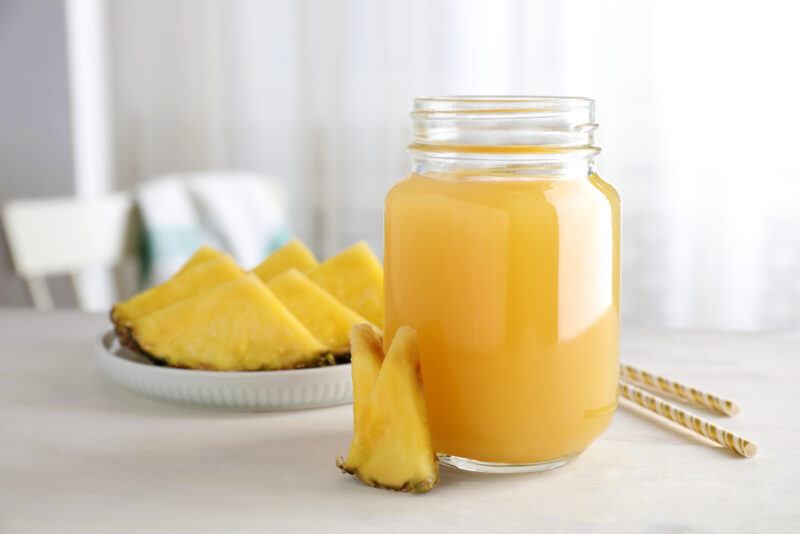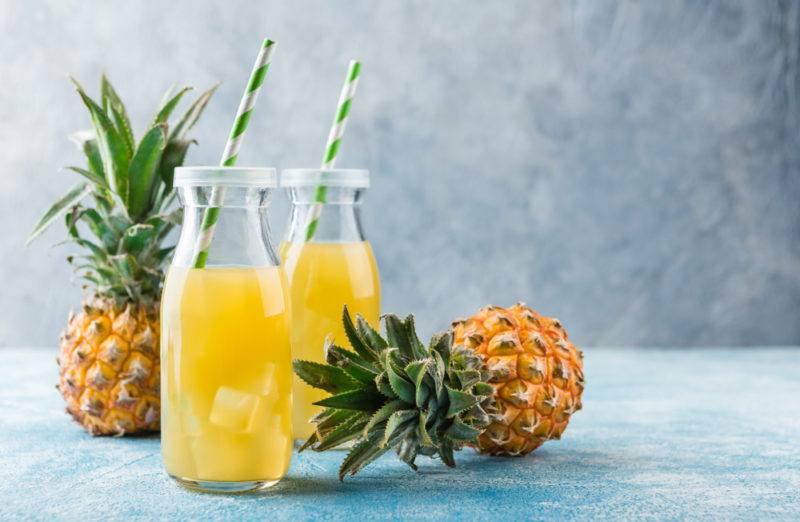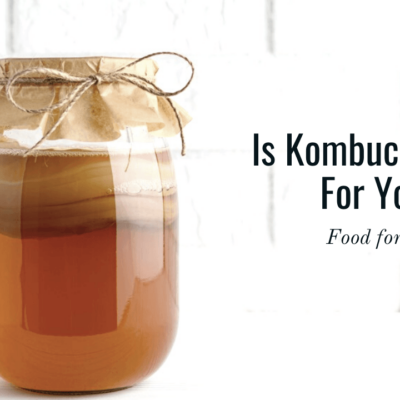
Pineapples are an amazing type of fruit, with a bright and vibrant flavor that’s perfect in cocktails, fruit salads, and countless other uses. These days you can even find pineapple vodka, which just proves how popular the flavor is.
Pineapples themselves offer many benefits, as they provide plenty of antioxidants, nutrients, and fiber. The biggest problem is the amount of sugar, but you can get around this by closely watching your portion size.
What about the juice then? Is pineapple juice good for you too or does it come with many more risks than benefits?
The question is a worthy one, as fruit juices are always controversial. They can seem much healthier than processed drinks like cola, yet they’re often just as high in sugar.
Is Pineapple Juice Good For You?
- Benefits Of Pineapple Juice
- How Pineapple Juice Could Be Harmful
- What About Pineapple Juice With Fiber?
- Is Pineapple Juice Better Than Soda?
- Final Thoughts
Benefits Of Pineapple Juice

The Vitamin C Content
Pineapple juice is a rich source of vitamin C. Some of this vitamin C comes from the pineapples themselves, but companies often add vitamin C as well, as this helps to preserve the flavor and color of the juice.
Needless to say, vitamin C is important, playing many different roles in our bodies. Despite longstanding myths, vitamin C won’t cure the common cold, but it may still help to strengthen your immune system.
While you can get vitamin C in plenty of places, adding a little more to your diet is often helpful – and what could be easier than pineapple juice?
May Decrease Inflammation
Pineapple juice contains bromelain, a group of enzymes that are found in fresh pineapple, pineapple juice, and few other places. Bromelain acts as an antioxidant and has also been linked to anti-inflammatory effects.
Some theories suggest that this effect might make pineapple juice useful for treating the pain related to sports injuries and osteoarthritis. There are also other antioxidants in pineapple juice too. These could make the anti-inflammatory effects of pineapple juice even more significant.
While most research has focused on bromelain itself, rather than pineapple juice, some studies show that pineapple juice can decrease inflammation. This could be a good reason to have the juice every so often.
Improves Iron Absorption
Interestingly, vitamin C also helps your body to absorb iron from plant-based sources. This is an important feature, as many of us don’t get enough iron currently.
So, if you’re having a salad, drinking a glass of pineapple juice at the same time could increase the amount of iron you absorb.
The effect can be powerful for kids, as they’re often reluctant to eat their greens and may only have small portions. Pineapple juice helps ensure they get the most benefits from the amount that they do eat.
A Rich Source Of Antioxidants

Fresh pineapple contains a variety of important antioxidants, including vitamin C and beta carotene. Not surprisingly, these antioxidants can be found in pineapple juice as well.
We talk about antioxidants a lot, but for good reason. They’re a powerful set of compounds that can decrease harmful oxidation throughout your body. Theories suggest that this effect might even lower your risk of disease.
Could Improve Your Immune System
The plant-based compounds in pineapple juice don’t just decrease oxidation. They’re relevant to your health in other ways too. One such effect is helping to boost your immune system.
By doing so, pineapple juice could help your body to fight off infections and help you to recover sooner.
However, you will need to pay attention to the amount of pineapple juice that you drink. The sugar in pineapple juice may partly suppress your immune system, so overdoing it with pineapple juice might do more harm than good.
How Pineapple Juice Could Be Harmful
The Amount Of Sugar
Fruit gets its sweetness from sugar. This isn’t normally a problem, as the fiber content of the fruit helps to offset the sugar. Plus, the benefits of fresh fruit far outweigh the risks of the sugar.
With fruit juice, however, the equation changes.
To start off with, you have much less fiber or perhaps none at all. You’re also dealing with a much more processed product, one that might contain additives. Even if there aren’t any additives, the processing steps could easily decrease the antioxidants and bromalin present.
The energy density changes as well.
For example, a cup of pineapple chunks contains around 82 calories, along with 2.3 grams of fiber and 16.3 grams of sugar, while a cup of pineapple juice contains 132 calories, 0.5 grams of fiber, and 25 grams of sugar.
It’s easy to see how these differences could be a problem. Remember too that it takes a while to eat a cup of pineapple chunks and you probably wouldn’t want much more than that in a serving. But, it’s easy to drink a cup of pineapple juice. You might even go back for a second one.
The Blood Sugar Impact

Because pineapple juice lacks fiber, it has a stronger blood sugar impact than pineapple pieces on their own. This can easily be an issue, especially if you have diabetes or prediabetes.
Keeping your portions of pineapple juice small may help to minimize the effect. You could also try to have other food at the same time, rather than drinking pineapple juice on its own.
If you have diabetes, however, pineapple juice is probably a no go. It’s much better to focus on fresh pineapples instead. Even then, you’ll need to be careful with your portion sizes.
Could Interact With Some Medication
While the bromelain in pineapple offers many potential benefits, it can also interact with medications.
In particular, bromelain can make some medications more effective, like blood thinners and antibiotics. This increase in effectiveness isn’t always a good thing, as it can cause unexpected outcomes and even put your health at risk.
To avoid problems, it’s best to check in with your healthcare provider if you’re taking any medications at all. They’ll quickly be able to tell you whether pineapple juice is a problem or not.
May Promote Heartburn
The acidity of pineapple juice can also be a problem, particularly if you have gastroesophageal reflux disease (GERD). If so, you may find that the juice increases acid reflux.
The safest option for vulnerable people is to avoid pineapple juice entirely. If you don’t want to do so, try diluting your juice with water. This way you’re consuming less at a time and your reflux may not be triggered in the same way.
It’s Less Powerful Than Fresh Pineapple
The final issue is that pineapple juice just isn’t as good for you as pineapple.
Fresh pineapple contains the same antioxidants and compounds as pineapple juice, but you’re getting much more fiber, which slows down the blood sugar impact. Plus, it’s hard to overdo it with fresh pineapple, while drinking too much pineapple juice is very easy indeed.
What About Pineapple Juice With Fiber?

Many issues with pineapple juice come from the fact that you lose the fiber from fresh pineapples. So, what happens if you drink pineapple juice that contains some fiber? Or, what about a smoothie, where you’re blending the pineapple and not straining any fiber out?
Both cases do give you more fiber, making them more powerful than regular pineapple juice.
But, some of the other issues still remain. You’re still getting a drink that’s high in sugar and calories, plus it’s still easy to consume too much.
The juicing process also breaks down the fiber somewhat, so it will hit your bloodstream faster. Because of this, even the most fiber packed smoothie influence your blood sugar levels much more than fresh fruit.
Is Pineapple Juice Better Than Soda?
Even with all the issues, pineapple juice should be a much healthier drink than soda, right? After all, it’s a natural product that provides nutrients, while soda is much more heavily processed and contains many more additives.
From that perspective, yes, pineapple juice is healthier.
However, fruit juice still contains as much sugar as soda (sometimes it is even higher in sugar) and that sugar has been linked to many health issues. For that matter, fruit juice contains more fructose than most sodas, which might make it even more harmful.
From this perspective, then, pineapple juice might be worse than soda.
Do the antioxidants and nutrients balance out the high fructose? Honestly, no. You can get nutrients and antioxidants from many sources, ones that are often much lower in sugar.
In the end, it’s best to see pineapple juice and soda as being roughly the same. Both are high sugar calorie bombs that won’t do your health many favors at all.
Final Thoughts
Fresh pineapples are an excellent source of fiber and nutrients, offering an array of benefits, but pineapple juice isn’t nearly as powerful. The juice loses all the benefits that fiber offers and ends up being much more calorie dense.
Without the fiber, the juice ends up having a much more dramatic blood sugar effect. It could easily lead to weight gain as well, especially if you drink more than one glass in a serving.
Most of the time, it’s best to avoid fruit juice almost entirely. You’ll get many more benefits from drinking straight water or low calorie drinks like lemon water and coconut water. If you are going to drink pineapple juice, it’s best to see it as a sweet treat, rather than a healthy drink.
Frequently Asked Questions
Does Pineapple Juice Help With Swelling?
The bromelain in pineapple juice could be relevant to inflammation and swelling. It may even help with pain in some cases.
However, you might get less bromelain in pineapple juice compared to pineapple itself – especially if you choose a highly processed product. In fact, canning pineapple may destroy some of the active compounds.
Can You Find Sugar Free Pineapple Juice?
All true pineapple juice will contain sugar, as pineapple itself has a decent amount of sugar. The best you can get is pineapple juice with no added sugar – which may still have 25 grams of sugar in a single cup.
Is Pineapple Juice Acidic?
Pineapples themselves are acidic, with a pH of between 3 and 4. So, pineapple juice tends to be acidic as well.
This means that people with acid reflux may need to avoid pineapple juice or stick with very small servings.
Should You Have Pineapple Juice Before Surgery?
Some people drink pineapple juice right before wisdom tooth surgery, to reduce pain and swelling. Interestingly, the approach really does seem to work.
However, the trend involves drinking around 64 ounces of pineapple juice. That’s a large amount of sugary and acidic juice, which could be bad for your teeth and weight.
The trend is exclusive to wisdom tooth surgery. If you’re undergoing any other type of surgery, it’s crucial that you talk to your doctor about any risks from pineapple juice.
Does Pineapple Juice Help A Cough?
Pineapple juice is a popular home cough remedy. Many people claim that it works, probably because of the bromelain.
However, like most natural remedies, there’s little evidence about whether pineapple juice helps or not. You’ll just need to experiment to see whether it helps you.

















 Are Jalapenos Good For You?
Are Jalapenos Good For You?
Leave a Reply